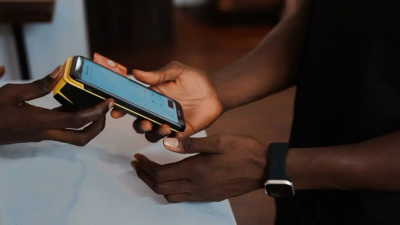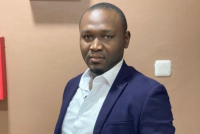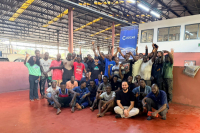- Trevor Murimba founded MyBitSecure to enhance farm efficiency and cybersecurity across Africa.
- MyBitSecure provides digital tools for data protection, crop monitoring, and operational management.
- The company bridges agriculture and technology to improve productivity, reduce risk, and strengthen decision-making.
Trevor Murimba, a Cape Town-based cybersecurity expert, founded MyBitSecure to help African farms improve efficiency and security through accessible digital tools. His solutions connect farms, protect sensitive data, and optimize crop monitoring and daily operations.
Founded in 2023, MyBitSecure supports farmers and agribusinesses with tools that boost productivity, secure sensitive information, and simplify decision-making. The company positions itself as a bridge between agriculture and technology, seeking to build more organized, profitable, and resilient farms.
The tools address practical needs: monitoring fields, managing connected equipment, safeguarding data, and training users to integrate technology into agricultural production. Each solution aims to make farm operations more precise, predictable, and less vulnerable to human error, internal incidents, or cyberattacks.
MyBitSecure enables farmers to track activities on their land, anticipate problems, and manage resources efficiently. Users gain centralized visibility, better protection of strategic information, and reliable data to guide investment, harvest planning, and operational adjustments.
In addition to entrepreneurship, Murimba serves as a cybersecurity specialist at KingMakers, a company that develops platforms connecting fans to their favorite sports. He holds a network engineering degree from the Ansted School of Technology at the University of Zimbabwe.
Murimba began his professional career in 2002 at Prean Computers in Zimbabwe as an IT technician. He later held cybersecurity roles at companies including Engen, a South African energy firm, and Old Mutual Ltd, a pan-African financial services provider.
This article was initially published in French by Melchior Koba
Adapted in English by Ange J.A de BERRY QUENUM
The United Nations Development Programme (UNDP) has launched Get Ready 4 Timbuktoo EdTech, a three-month online incubation programme for African EdTech startups with working prototypes. Up to 50 startups will receive tailored diagnostics, specialised training modules, weekly mentoring, access to grants, and entry into the Timbuktoo network. Applications are open across Africa until February 18, 2026.
LemFi, a Nigerian fintech focused on underserved communities, is launching its money transfer services in Australia after securing regulatory approval. Australia, one of the world’s largest remittance markets, now joins LemFi’s network of more than 2 million users across Europe and North America, enabling transfers to over 30 countries, including India, China, and Nigeria.
Nigerian fintech Nomba has acquired a licensed Canadian payment provider to expand its cross-border infrastructure for businesses. The deal allows Nomba to open Canadian dollar accounts and speed up payments into the naira and other African currencies, while reducing foreign exchange and transaction costs. The move positions the company to tap growing trade flows between Africa and Canada, with plans to expand into other markets.
- Database offers 11,000 hours across 21 languages, open access
- Project aims to boost voice AI and preserve African languages
Google said on Monday, Feb. 2, it had launched WAXAL, a voice database aimed at supporting the development of AI tools tailored to Sub-Saharan Africa. The dataset covers 21 languages, including Yoruba, Acholi, Hausa, Luganda, Malagasy and Shona, and contains more than 11,000 hours of audio from nearly 2 million recordings.
“We wanted to capture how people really talk, so we asked participants to describe different pictures in their native languages. We also recorded professional voice actors in the studio to create the high-quality audio needed for text-to-speech technology,” Google said, adding that professional voice actors were also recorded in studios to provide high-quality material for text-to-speech systems.
The company said WAXAL includes 1,250 hours of transcribed speech for automatic speech recognition and more than 20 hours of studio audio for text-to-speech synthesis. The project was developed with African partners including Makerere University in Uganda, the University of Ghana and Digital Umuganda in Rwanda.
WAXAL is available under an open licence on the Hugging Face platform, giving researchers and developers free access. Google said the initiative aims to spur innovation in voice technology and help safeguard African languages online.
UNESCO estimates Africa is home to between 1,500 and 3,000 languages, but most digital tools support only a handful. Limited high-quality data has slowed the development of voice assistants, educational apps and automated transcription on the continent.
Several local initiatives are also working to address the shortage. In Benin, the “JaimeMaLangue” project encourages citizens to help build a national voice database. Other datasets, such as African Voices in Nigeria and African Next Voices in Mali, are expanding resources for underrepresented languages.
Samira Njoya
As digital education continues to expand across Africa and the Middle East, Skirora is positioning itself as an online learning platform that enables educators to earn income from digital teaching content.
Skirora is an online learning platform developed by a Tunisian startup. It aims to provide education tailored to regional needs while offering instructors a revenue model based on sales commissions. Yacine Aridhi launched the startup in 2025.
“We make education accessible, flexible and skills-driven: students can learn at their own pace, instructors can monetize their expertise, and companies can access qualified talent through a modern, high-quality platform,” the startup said.
It added that Skirora brings together courses in mathematics, coding, business, languages, design and personal development on a single platform, developed by the team that created Tuniform.
Unlike some global platforms that may not reflect local realities, Skirora offers a full suite of tools for teachers and trainers. Educators can create structured courses, manage enrolments and deliver clear learning experiences.
The platform says it prioritizes learning outcomes over viral or unstructured short-form content, responding to demand for online education that delivers measurable results, such as course completion and practical skills acquisition.
Currently in development, Skirora is focusing first on the reliability of the learning experience and instructor engagement. The startup plans to expand beyond Tunisia by attracting educators and learners from other regional and international markets.
By combining local accessibility, robust teaching tools and an economic model aligned with educators’ success, Skirora is positioning itself as a new entrant in Africa’s edtech ecosystem.
Adoni Conrad Quenum
-
Signe Fokui Maxime founded and leads Bitkap, a multifunction digital wallet that supports FCFA and U.S. dollar transactions.
-
Launched in 2020, Bitkap enables free international transfers, instant currency conversion and online payments.
-
The platform targets financial inclusion by reducing costs and complexity in cross-border and domestic payments.
Signe Fokui Maxime is a Cameroonian software developer and technology entrepreneur. He founded and currently serves as chief executive officer of Bitkap, a multifunction application that operates as a digital wallet, money transfer service and online payment solution.
Launched in 2020, Bitkap allows users to deposit, store, send and withdraw money in CFA francs and U.S. dollars. The application focuses on simplifying everyday transactions by offering a fast and seamless experience completed in just a few clicks.
Users can fund their accounts in FCFA or USD and transfer funds using a username known as a cashTag or a QR code. The system allows users to avoid sharing bank details or mobile money numbers. Bitkap offers free international transfers, which eliminates fees that often increase the cost of cross-border remittances.
Bitkap also differentiates itself through instant currency conversion. Users can deposit funds in one currency and withdraw them in another without using traditional foreign exchange services and their often unfavorable rates. The application displays real-time exchange rate movements between the CFA franc (XAF) and the U.S. dollar (USD), which enables users to choose optimal conversion timing. The platform completes peer-to-peer transfers in four simple steps and provides continuous transaction tracking.
In addition, Bitkap allows users to generate instant virtual Visa cards for online payments on platforms such as Facebook, Amazon, Netflix, PayPal and betting websites. The application also enables immediate mobile airtime purchases in FCFA or USD for all mobile operators operating in Cameroon.
Signe Fokui Maxime earned a university diploma in mathematics in 2016 from the University of Douala. He obtained a bachelor’s degree in software engineering in 2019 from the University of Dschang. He later continued his studies in France at the École Supérieure des Technologies de l’Information Appliquées aux Métiers, where he earned a master’s degree in artificial intelligence in 2024.
He began his professional career in 2016 at Cameroonian fintech Ring Corporation as a developer. In 2019, he joined IT company ACESY as lead software development engineer. He later moved to French technology firm Dembou Consulting, where he worked as a Java developer until 2020.
This article was initially published in French by Melchior Koba
Adapted in English by Ange J.A de BERRY QUENUM
-
Audrey Ludivine Baha co-founded and leads Nofey, a digital platform that connects individuals with vetted local artisans across Africa.
-
Founded in 2025, Nofey enables service booking, reviews and Mobile Money payments to build trust in informal service markets.
-
Baha combines an engineering background with advanced entrepreneurial training at HEC Paris.
Audrey Ludivine Baha is a Cameroonian agro-industry engineer and entrepreneur. She co-founded and currently serves as chief executive officer of Nofey, a startup that helps individuals easily find reliable artisans and technicians across Africa.
Founded in 2025, Nofey operates a mobile application that connects households with artisans, technicians and other professionals who meet everyday needs. The company focuses on building trust between service seekers and service providers in markets that remain largely informal.
For individuals, the platform enables fast access to nearby, vetted artisans. Users can search for services such as plumbing, electrical work, hairdressing, mechanics, carpentry, painting, air conditioning, locksmithing, gardening and masonry, among others. Each professional maintains a profile that includes ratings, customer reviews and practical information to assess reliability. The platform processes payments through Mobile Money, which ensures secure transactions adapted to local usage patterns.
Nofey also provides artisans and technicians with tools to showcase their skills and expand their customer base. Service providers can create professional profiles, receive client requests, manage bookings and receive prompt payments through the platform. A dedicated provider application offers activity management tools designed to increase job opportunities and strengthen professional credibility.
The company designed the user experience to remain simple and intuitive. Users search for a service, review professional profiles, communicate through in-app messaging, then book and pay directly within the application. The process enables users to secure a service provider within minutes.
Baha earned an engineering degree in agro-industry in 2025 from UniLaSalle in France. She is currently completing a master’s degree in entrepreneurial studies at HEC Paris. She began her professional career in 2021 as an assistant engineering intern at Les Chocolateries Artisanales Nohi in Cameroon.
After completing a production internship at French agrifood company Cycloponics, she worked as a freelance translator in 2023. In 2024, she joined French natural beverage brand Necence as a research and development assistant. The company promoted her three months later to project manager in R&D and sourcing.
This article was initially published in French by Melchior Koba
Adapted in English by Ange J.A de BERRY QUENUM
-
GoCab raised $45 million in equity and debt to expand electric and inclusive mobility solutions in Africa.
-
The funding round combined $15 million in equity and $30 million in debt led by E3 Capital and Janngo Capital.
-
GoCab reported more than $17 million in annual recurring revenue across five African markets after 18 months of operations.
In a statement released on Tuesday, February 3, mobility and vehicle financing fintech GoCab announced the closing of a $45 million funding round. The transaction included $15 million in equity and $30 million in debt and aimed to accelerate the rollout of electric and inclusive mobility solutions across multiple African markets.
E3 Capital and Janngo Capital led the funding round alongside KawiSafi Ventures and Cur8 Capital. The company said it would use the funds to strengthen operations in existing markets, enter new high-growth cities and increase the share of electric vehicles in its fleet. GoCab also plans to deploy artificial intelligence-based tools for credit scoring, fleet optimization and risk management.
“In Africa, millions of people remain excluded from both mobility and financing. This funding round allows us to scale while expanding access to ethical financing and accelerating the transition to electric mobility,” said Azamat Sultan, co-founder and executive chairman of GoCab.
Azamat Sultan and Hendrick Ketchemen founded GoCab in 2024 after careers in investment banking focused on structured finance and emerging markets. The company set out to address limited access to financing and vehicle ownership for platform economy workers. GoCab offers a model that allows drivers and delivery workers to generate stable income while gradually acquiring ownership of their vehicles.
After 18 months of operations, GoCab operates in five African markets and reports more than $17 million in annual recurring revenue. The company employs more than 120 people representing 18 nationalities. GoCab supports several thousand drivers and aims to help structure more sustainable urban mobility systems.
As Africa’s platform workforce continues to grow while remaining largely excluded from traditional financial systems, GoCab aims to position itself as a key player in sustainable mobility. Over the medium term, the company targets the deployment of 10,000 operational vehicles and $100 million in annual recurring revenue by combining ethical financing, technology and energy transition.
This article was initially published in French by Samira Njoya
Adapted in English by Ange J.A de BERRY QUENUM
Google is testing a new Gemini feature called Import AI Chats, which would let users transfer their chat histories from rival assistants such as ChatGPT, Claude and Grok. By carrying over context and user preferences, the tool aims to reduce switching costs. Still in beta, the feature could add momentum to broader efforts across the industry to improve data portability and interoperability.
More...
Paga, via its Doroki merchant platform, has formed a strategic partnership with Nigeria’s Leadway Assurance to provide tailored insurance solutions for retailers. The current rollout includes coverage for cash-in-transit, fire and theft, and Point-of-Sale (POS) terminal protection. Soon, the partnership will expand to offer credit life insurance for Memento loans. Beyond coverage, the initiative focuses on building merchant resilience through risk awareness and education.
Onafriq Nigeria Payments Limited has partnered with the Pan-African Payment and Settlement System (PAPSS) to launch a pilot of the first cross-border wallet payment service between Nigeria and Ghana. The six-month trial, approved by the Central Bank of Nigeria, allows payments to be made in naira and settled in real time, using the partners’ banking and mobile money networks. The service is aimed at consumers, merchants and small businesses.
- DR Congo’s Fogec launches Bokeli, a digital platform to streamline business plan development and financing applications for SMEs and startups.
- The platform standardizes information for financial institutions and reduces administrative barriers to credit approval.
- Over five years, Fogec has supported nearly 300 projects, totaling $3.2 million, while Congolese startups raised $2 million in 2024, highlighting the financing gap.
The Entrepreneurship Guarantee Fund in Congo (Fogec) launched a digital platform, Bokeli, on February 3 in Kinshasa to help entrepreneurs structure business plans and submit financing applications electronically. The platform is part of DR Congo’s broader effort to strengthen SME and startup access to credit.
Entrepreneurs can access Bokeli at https://bokeli.fogec.cd/ to create business plans, prepare financial documentation, and transmit their applications to relevant institutions. The system aims to standardize the data required by banks and guarantee mechanisms, while reducing administrative hurdles that slow financing approvals.
Fogec said the initiative addresses a key challenge in the Congolese entrepreneurial ecosystem: many project owners struggle to produce technically sound applications that meet banks’ requirements. “Our mission is to facilitate access to financing for SMEs, startups, and artisans by providing guarantees to viable projects,” the institution said.
The launch comes amid a growing entrepreneurial environment, driven by a young population increasingly engaged in economic activities. Despite this dynamism, access to structured financing remains limited. According to Partech Africa, Congolese startups raised $2 million in 2024, up from $1 million in 2023, still modest relative to market potential.
Fogec said it has supported nearly 300 projects totaling $3.2 million over five years. By offering a digital tool for business planning and application submission, the institution seeks to improve project bankability and facilitate interactions between entrepreneurs, guarantee structures, and financial institutions, boosting national productive capacity.
Samira Njoya
- Algeria exempts certified startups from IPO and listing fees on the Algiers Stock Exchange until 2028, targeting fundraising up to 500 million dinars ($3.85 million).
- The measure applies to the “Croissance” segment, designed for high-potential companies, and aims to reduce barriers to capital market access for startups.
- Only one Algerian startup, Moustachir, has listed to date, achieving regional expansion and projected revenue growth to 187 million dinars by 2028.
Algeria’s capital market authorities aim to stimulate startup financing by waiving IPO fees for certified startups until 2028. The measure, announced February 1 by the Commission d’Organisation et de Surveillance des Opérations de Bourse (COSOB) in coordination with the Société de Gestion de la Bourse des Valeurs (SGBV) and Algérie Clearing, allows young companies to raise funds without paying listing or administrative costs.
The exemption covers the “Croissance” segment of the Algiers Stock Exchange, a market tier for high-potential companies. Eligible startups avoid fees for document review, listing, administration, securities custody, and management. The initiative applies to fundraising operations capped at 500 million dinars ($3.85 million) and is valid for transactions conducted between 2026 and 2028.
Algeria hosts over 7,800 startups on the official portal startup.dz, with roughly 2,300 certified as official “startups.” Authorities view the fee waiver as a key lever to enhance access to capital markets, a historically limited source of funding for young companies.
The policy complements broader public strategies to support entrepreneurship and innovation as drivers of economic diversification. The Algiers Stock Exchange remains small, listing only eight companies as of mid-2025, including the Banque de Développement Local (BDL) and the startup Moustachir.
Moustachir, the only startup to have listed so far, joined the exchange in 2024. The company projected revenue above 55 million dinars in 2025, with a target exceeding 187 million dinars by 2028. Within two years, it has expanded into Middle Eastern markets, including Oman and the United Arab Emirates.
Samira Njoya















